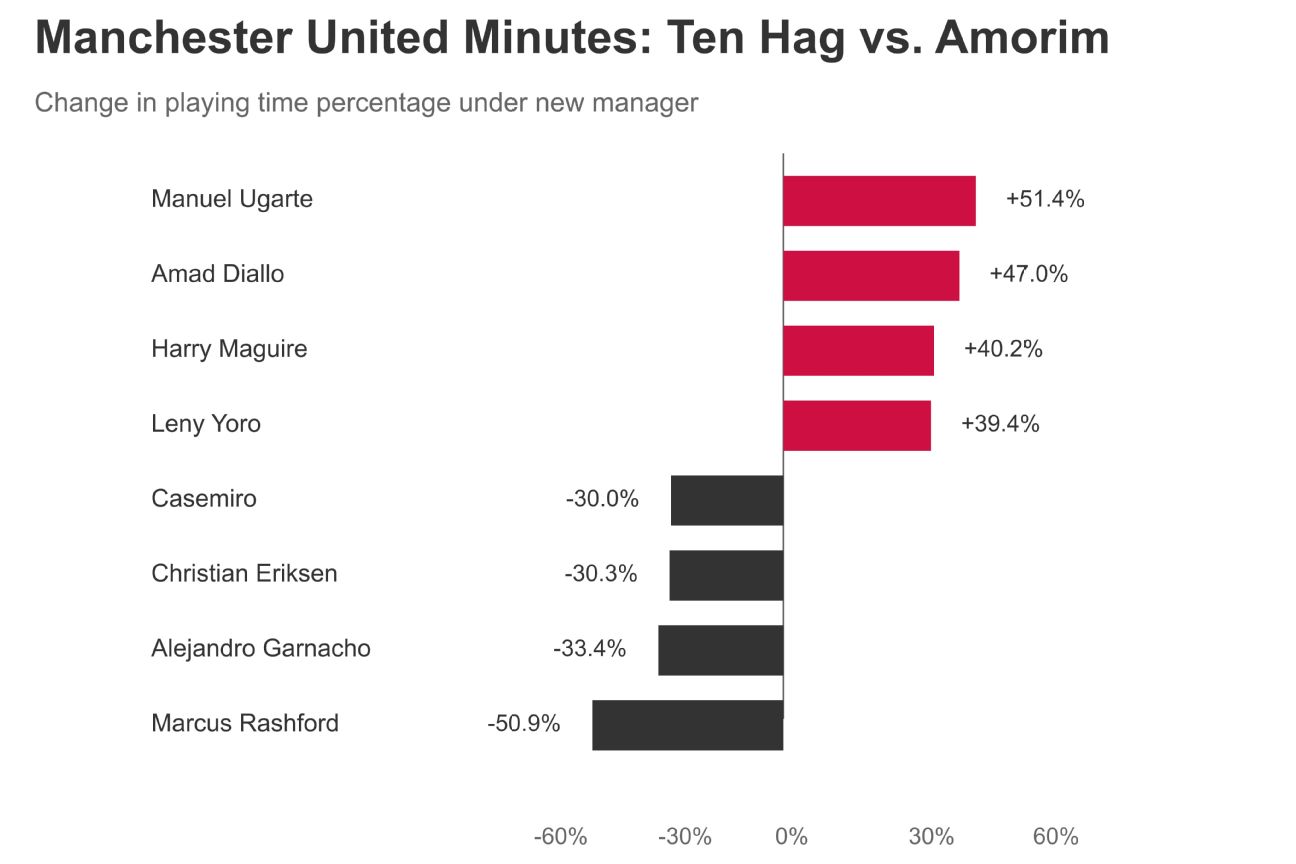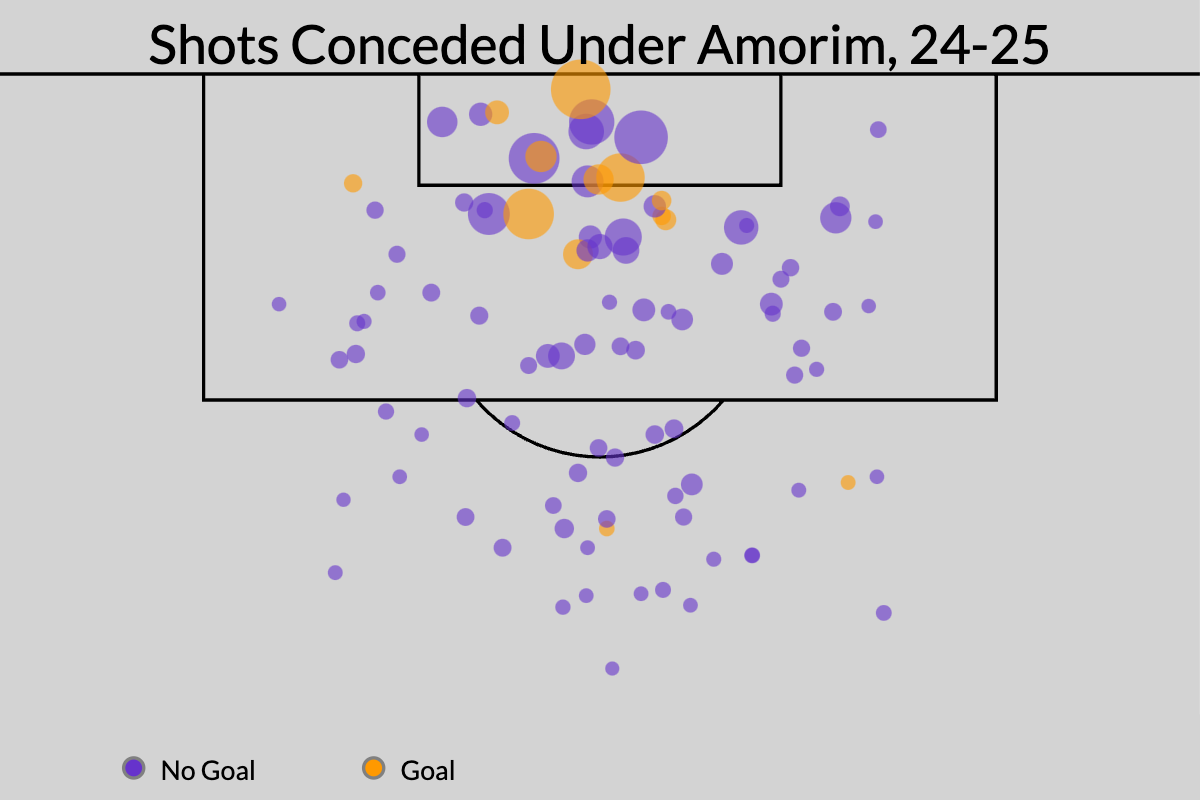Meet our two new managers.
First, we have Coach A. He has drawn with Ipswich Town, and he's lost to Arsenal, Nottingham Forest, Bournemouth, Wolves and Newcastle. That's six matches for one point. Across this slate, his team have allowed 13 goals and scored just three.
Then, we have Coach B. He has both pummeled the relegation-strugglers and gone toe-to-toe with the big boys. He beat Everton 4-0. He went to the Etihad and handed Manchester City a 2-1 loss, and had one of his players not skied a wide-open chance over the crossbar in injury time, he would have beaten league-leading Liverpool at Anfield.
We have one coach who looks like he might lose his job already, and another coach who seems like he's ready to conquer the Premier League. We also have: the same coach.
These are all of Ruben Amorim's results since taking over for Erik ten Hag as Manchester United manager in late November -- smashing the big ones and slipping up on the small ones.
- Stream FA Cup live on ESPN+: Man United vs. Arsenal (Sunday, 10 a.m. ET)
Ahead of Man United's FA Cup match with Arsenal on Sunday, let's try to wrap our heads around Amorim's confounding first nine matches in charge by looking at three different ways things may have changed: personnel, playing style and performance.
Man United player selection
The easiest lever a new coach can pull: playing time.
Overall, I'm not sure there's a more important part of a manager's job than figuring out which players to put on the field. This is essentially the only thing he has direct control over. He can try to instill tactics, grow confidence and improve individuals, but his efforts are only one input among a number of factors that mix together and produce a result. Plus, any of those effects will take a while to bear fruit; Amorim has been in charge for only a month-and-change.
With selecting lineups and making in-game substitutions, you decide who is and who isn't out there -- and that's it. Plenty of people who work for clubs or teams in American sports have told me that this is a coach's most important job: make sure the best players are on the field.
So, does Amorim see the quality of the United squad any differently than Ten Hag did? They've now both coached nine league matches this season, and this is where they've differed most in their personnel decisions:

The increase in minutes for Leny Yoro is almost purely injury related -- he wasn't available for selection when Ten Hag was coach, but he came back a few weeks ago. Otherwise, Amad Diallo has become a core member of the starting XI after playing fewer than 50% of the minutes under Ten Hag. Harry Maguire missed a chunk of time in the middle of the season, but is still playing more for Amorim -- when available -- than he did under Ten Hag. And Manuel Ugarte only started one match when Ten Hag was still coach, but he's started six of the last seven for Amorim.
More interesting, though, is whom Amorim has opted to drop. Unsurprisingly, Casemiro has been marginalized into a squad player -- it's time, it was time, it's been time. Same goes for Christian Eriksen. They used to be fantastic, but neither of these guys can handle the speed or physicality of the Premier League anymore. Despite a couple of recent examples to the contrary, this is usually what happens when you hit your 30s.
That's not the case with Marcus Rashford, though. He's 27 -- and should be right in the middle of his prime -- but he's not even making the matchday squad under Amorim anymore. He was the most-used attacker under Ten Hag. Given how inconsistent Rashford has been over his career and the kind of symbolic role he holds at the club, it's not totally shocking that this happened.
New coaches do this all the time in order to try to stamp their authority or whatever. Jürgen Klopp did it. Pep Guardiola did it. Mikel Arteta did it. They come in, decide that one specific high-profile player doesn't exactly fit their plan, and tell him it's time to hit the road. Rashford is signed through 2028, so I'm not exactly sure how Amorim expects this to work out in practice over the next three years, but that's a conversation for another time.
Maybe even more surprising, though, is the lack of playing time for Alejandro Garnacho. He was the one United prospect who was already capable of playing at a top-four level, and I assumed any coach who took over for Ten Hag would've made Garnacho a core piece of the team going forward. Now, I'd still expect that to happen, eventually, but he hasn't started a match since being left off the matchday squad for the Manchester City game.
A new playing style for Man United
Before arriving in England, Amorim was billed as an uncompromising back-three evangelist, and he has not disappointed in that regard. Per FBref, United played a 4-2-3-1 in every match this season before Amorim arrived. Since then, they've played a 3-4-3 in every single match.
Of course, those are just numbers. Most teams shape-shift throughout a match -- attacking in one shape, defending in another. There's no real connection between the numbers we use to describe a team's formation and how they actually play.
So, how does Amorim's United actually play? So far: slow. Really slow.
The decade since Sir Alex Ferguson retired has been a tactical push-and-pull at the club. Most of the team's best stretches have come when they're embraced a little more chaos and played in transition. At the same time, it's hard to consistently compete at the highest level without exerting more control over matches, so eventually someone will try to implement a new possession structure, it'll fail, he -- or his replacement -- will embrace transition, counter-attacking work for a season, but it won't work over a full year, and then the cycle starts again.
Ruben Amorim reacts to a much-improved Manchester United performance in their 2-2 draw at Anfield.
We'll see if the pattern continues, but Amorim's team is clearly trying to implement some kind of more measured approach with the ball. Across their nine matches, they're moving the ball up the field at a rate of 0.88 meters per second. Over the full season, that would be the slowest rate in the league. The league average is 1.23 -- they averaged 1.14 under Ten Hag. In fact, that would be the slowest rate of any team in Europe's "Big Five" top leagues.
Now, I do think Amorim wants United to slow down. Sporting were the second-slowest team in Portugal last season -- but they were basically Steve Nash's Phoenix Suns (1.30 m/s) compared to Amorim's United side. Manchester City are pretty much the only team we've ever seen have high-level success while moving the ball upfield at a less-than-1-meter pace, and they're a complex Rube Goldberg machine that only Pep Guardiola could create.
United are slowing down on purpose -- but I can't imagine they want to be moving this slow. The main passing pattern in buildup from Amorim's first nine matches is a ball back to the goalkeeper. Two of the three center-backs then stretch out toward the sidelines next to him. He plays the ball wide to one of them. Then one of the opposition attackers presses the ball, the center back has nowhere to go because there's someone bearing down on him and the sideline to his immediate outside shoulder, and so he just boots it long.
The main reason United's play registers as so slow is not that they want to move this slow -- it's that they're struggling to find ways to move the ball forward at speed while maintaining possession.
When they do get the ball forward, they're pressing more aggressively and more effectively than they were under Ten Hag. The opposition pass-completion rate has dropped from 83.6% to 82.9%, and United's PPDA (passes allowed per defensive action) has dropped from 12.65 to 10.64. Keep in mind, that's with away matches to Man City and Liverpool -- two games that should tank your pressing numbers over a small sample.
The problem, so far, is that they just can't get the ball upfield. Their overall share of possession has jumped from 53% to 55% from Ten Hag to Amorim, but their overall share of final-third possession has actually dipped, 55% to 50%.
Performance in Amorim's new system
At the attacking end, it's all added up to a team that passes the ball a ton, but doesn't take many shots. Under Amorim, they're playing 43 passes for every shot -- a higher rate than every team in the league other than the two worst teams in the league, Leicester City and Southampton.
Although they've scored more goals under Amorim than under Ten Hag, that's mostly noise. United fired Ten Hag in the midst of an unsustainably bad finishing run, but their chance-creation has actually gotten worse under Amorim. They're taking fewer touches in the box, playing fewer through balls, and attempting fewer pullbacks. They created 1.64 xG, or expected goals, per match with Ten Hag this season, and that number is down to 1.16 under Amorim. Across the full season, that would rank 15th in the league.

It's the opposite story at the other end: they've conceded more goals under Amorim but the fundamentals of the defense have actually improved. They're allowing fewer shots, fewer touches inside their own penalty area, and most importantly, fewer expected goals. They were conceding 1.71 under Ten Hag, and under Amorim it's now down to 1.48, which is right around league average.
If we add it all up and strip out penalties, Amorim's Man United have produced a per-game xG differential of minus-0.24. Under Ten Hag this season, they were significantly better, up at plus-0.11.
So, Amorim out?
Not quite. The schedule has been quite tough -- with the games against Arsenal, Man City and Liverpool. But that doesn't really even matter. When Man United hired Amorim, they knew this was going to take time. That's the reason he was available to be hired in the first place.
As we reported last summer, other big clubs were scared off of Amorim because of his refusal to compromise on his system. He literally told teams that he was not going to be pragmatic. This is not a guy who is going to do what Thomas Tuchel did at Chelsea -- come in at midseason, assess the talent at his disposal, and build a system that immediately maximizes what's on his roster.
No, he's going to install his own system, he's going to freeze out high-profile players who don't fit it, and he's going to force your ill-suited players to play his way because he thinks the long-term benefits outweigh the short-term struggles. If he's right -- and that's still a big if -- then this might be the kind of reset that could break the club out of its 10-year cycle of mediocrity.
He has a specific formation and a specific style of play, and since Manchester United hired him in the middle of the season, they have approximately zero players on the roster who were acquired because they fit Amorim's system. Amorim has made the team worse because that's what United brought him in to do -- whether they realize it or not.
